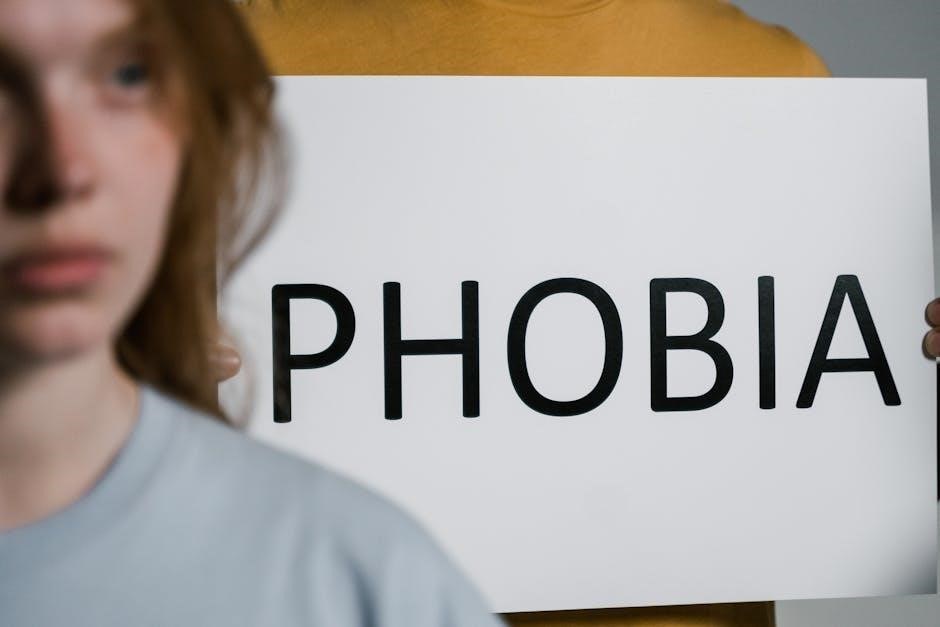Overview of Mental Health IOP
An Intensive Outpatient Program (IOP) for mental health provides structured therapy for individuals needing more support than weekly sessions but not requiring inpatient care. It focuses on empowering participants to manage mental health challenges through evidence-based approaches‚ offering a balance of group and individual sessions;
1.1. Definition and Purpose
An Intensive Outpatient Program (IOP) for mental health is a structured‚ non-residential treatment model designed for individuals requiring intensive support without needing 24/7 inpatient care. It focuses on addressing mental health challenges through evidence-based therapies like CBT and DBT‚ aiming to empower participants to manage symptoms‚ develop coping strategies‚ and achieve long-term recovery. The program is tailored for adolescents and adults‚ offering a flexible yet comprehensive approach to mental health care‚ ensuring individuals can maintain daily responsibilities while receiving treatment.
1.2. Target Audience
The IOP is ideal for adults and adolescents struggling with mental health challenges‚ such as moderate psychiatric symptoms‚ substance use disorders‚ or co-occurring issues. It serves individuals needing more intensive support than weekly therapy but not requiring full hospitalization. The program is tailored for those who can maintain daily responsibilities while engaging in structured treatment. It also addresses emerging adults and professionals balancing work demands with mental health recovery‚ ensuring a flexible and inclusive approach to care.

Key Components of the Curriculum
- Cognitive-Behavioral Therapy (CBT) skills to identify and change negative thought patterns.
- Dialectical Behavioral Therapy (DBT) techniques for emotional regulation and distress tolerance.
- Stress management strategies to enhance coping abilities and overall well-being.
2.1. Cognitive-Behavioral Therapy (CBT) Skills
Cognitive-Behavioral Therapy (CBT) is a cornerstone of mental health IOP curricula‚ focusing on identifying and restructuring negative thought patterns. Participants learn to challenge unhelpful beliefs and replace them with constructive ones. This approach emphasizes problem-solving and skill-building to address specific issues like anxiety‚ depression‚ or trauma. Through structured exercises‚ individuals develop coping strategies to manage emotions and behaviors more effectively. CBT’s evidence-based methods promote long-term behavioral change‚ empowering individuals to navigate daily challenges with greater resilience and emotional stability‚ ultimately enhancing their overall mental well-being and quality of life.
2.2; Dialectical Behavioral Therapy (DBT) Skills
Dialectical Behavioral Therapy (DBT) focuses on teaching individuals skills to manage intense emotions‚ reduce self-destructive behaviors‚ and improve relationships. The curriculum emphasizes four core modules: Mindfulness‚ Distress Tolerance‚ Emotional Regulation‚ and Interpersonal Effectiveness. Through structured group sessions‚ participants learn to balance acceptance of their current emotions with strategies for positive change. DBT skills are particularly effective for addressing emotional dysregulation‚ fostering resilience‚ and promoting long-term personal growth. This approach encourages individuals to apply these skills in real-life situations‚ enhancing their ability to cope with challenges and improve overall mental well-being.
2.3. Stress Management Techniques
Stress management techniques are essential for helping individuals cope with daily pressures and mental health challenges. These techniques include mindfulness practices‚ relaxation exercises‚ and cognitive restructuring. Mindfulness helps participants stay present‚ reducing anxiety about the future or past. Relaxation methods‚ such as deep breathing and progressive muscle relaxation‚ alleviate physical tension. Cognitive restructuring assists in identifying and changing negative thought patterns. These strategies empower individuals to manage stress effectively‚ improving emotional well-being and resilience. By incorporating these techniques into daily routines‚ participants can better navigate life’s challenges and maintain mental health stability.

Structure and Duration
The IOP typically lasts several weeks‚ with sessions 3-5 days a week‚ depending on the program. The structured curriculum ensures consistent progress without requiring inpatient care.
3.1. Program Length and Intensity
Mental Health IOP programs typically range from 6 to 12 weeks‚ with varying intensity levels. Sessions are usually 3-5 days per week‚ totaling 10-15 hours weekly. The curriculum is designed to provide a structured yet flexible approach‚ allowing participants to balance treatment with daily life. Intensity may decrease as progress is made‚ ensuring a gradual transition to independence. Programs often include a mix of group therapy‚ individual sessions‚ and skill-building exercises tailored to address specific mental health needs effectively.
3.2. Weekly Commitment and Schedule
Mental Health IOP programs typically require a commitment of 3-5 days per week‚ with sessions lasting approximately 3 hours each. This totals 9-15 hours weekly‚ depending on the program’s intensity. Schedules are often flexible‚ offering morning or afternoon sessions to accommodate work‚ school‚ or family obligations. The structured format ensures consistent participation‚ with a mix of group therapy‚ individual sessions‚ and skill-building exercises. This routine helps participants stay engaged and progresses toward their mental health goals while maintaining daily responsibilities. Programs may adjust schedules based on individual needs and progress.
Goals and Outcomes
The primary goals of an IOP are to empower individuals‚ foster long-term recovery‚ and develop effective coping strategies. Outcomes include improved mental health‚ stress management‚ and resilience.
4.1. Empowerment for Long-Term Recovery
Empowerment is a cornerstone of IOPs‚ aiming to equip individuals with tools for sustained mental well-being. By fostering self-awareness‚ personal responsibility‚ and mastery of coping skills‚ participants gain confidence to navigate life challenges independently. The curriculum emphasizes building resilience and self-efficacy‚ enabling individuals to maintain progress beyond the program. This focus on empowerment ensures that recovery is not just immediate but enduring‚ providing a strong foundation for long-term mental health management and overall quality of life.
4.2. Development of Coping Strategies
The IOP curriculum emphasizes the development of adaptive coping strategies to manage mental health challenges effectively. Through evidence-based techniques like DBT and CBT‚ participants learn to identify triggers‚ regulate emotions‚ and respond to stressors constructively. Practical exercises and group discussions help individuals apply these strategies in real-life scenarios‚ fostering emotional resilience and problem-solving skills. By mastering these tools‚ individuals can better navigate daily challenges‚ leading to improved mental well-being and enhanced quality of life. This skill-building focus ensures participants are equipped to handle future stressors with confidence and efficacy.

Evidence-Based Approaches
Mental Health IOP incorporates evidence-based techniques like CBT and DBT‚ focusing on scientifically validated methods to address mental health challenges effectively and promote lasting recovery.
5.1. Scientifically Backed Methods
Mental Health IOP curricula utilize evidence-based therapies like Cognitive-Behavioral Therapy (CBT) and Dialectical Behavioral Therapy (DBT). These methods are scientifically validated to address mental health challenges effectively. CBT focuses on identifying and changing negative thought patterns‚ while DBT emphasizes emotional regulation and coping skills. Both approaches are widely recognized for their efficacy in treating various mental health conditions. By integrating these scientifically backed methods‚ IOP programs ensure participants gain practical tools to manage symptoms and improve their quality of life. Regular practice and application of these techniques are encouraged to reinforce long-term recovery and personal growth.
5.2. Integration of PBL and CAx
The curriculum incorporates Problem-Based Learning (PBL) and Computer-Aided Technologies (CAx) to enhance professional competencies. PBL engages participants with real-life mental health scenarios‚ fostering critical thinking and practical problem-solving. CAx tools provide interactive simulations and visual aids‚ enabling immersive learning experiences. Together‚ these methods bridge theoretical knowledge with hands-on application‚ preparing individuals to address complex mental health challenges effectively. This integration ensures a dynamic and adaptive learning environment tailored to modern mental health care demands‚ promoting skill mastery and long-term professional development. The combination of PBL and CAx enriches the IOP curriculum with innovative and evidence-based educational strategies.

Implementation and Availability
Mental Health IOP programs are increasingly available in healthcare networks‚ with launches like Fawzia Sultan Healthcare Network’s 2023 program and Guardian Recovery’s 2024 initiative expanding access.
6.1. Launch of IOP Programs
The launch of Intensive Outpatient Programs (IOPs) for mental health has gained momentum‚ with networks like Fawzia Sultan Healthcare Network initiating programs in 2023 and Guardian Recovery in 2024. These programs are designed to meet growing demand‚ offering structured curricula focused on evidence-based therapies. Targeting adolescents and professionals‚ they emphasize skills development for long-term recovery. A minimum three-day weekly commitment is often recommended‚ ensuring immersive engagement with therapeutic techniques and stress management strategies. These launches reflect a strategic expansion of mental health services‚ addressing diverse patient needs effectively.
6.2. Availability in Healthcare Networks
Mental Health IOPs are increasingly integrated into healthcare networks‚ enhancing accessibility for diverse populations. Fawzia Sultan Healthcare Network and Guardian Recovery exemplify this trend‚ offering specialized programs tailored to adolescents and professionals. These programs are strategically designed to address substance use‚ co-occurring disorders‚ and mental health challenges. By embedding IOPs within established healthcare systems‚ providers ensure continuity of care‚ making it easier for individuals to transition between treatment levels. This integration underscores a commitment to comprehensive‚ patient-centered mental health services‚ ensuring broader reach and impact within communities.



